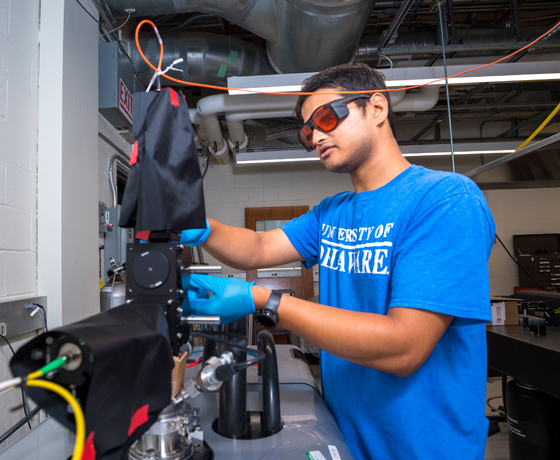
M.S. Degree | Quantum Science and Engineering

Fast-track your entrance into the Quantum Workforce
Designed for people who want to learn the foundations of the field and enter the workforce relatively quickly, the M.S. program can be completed in as little as one year. The coursework for all three tracks involves a modified core-curriculum that is shared with students in other tracks as well as those pursuing their Ph.D. Students can enroll in individual classes on a per-credit basis, allowing them to pace their education in a way that works for them. To help prepare students for the workforce, the program is designed to be flexible to accommodate internships.
A Great Career Choice
According to the Harvard Business Review, "Just as classical computers reduced the cost of arithmetic, quantum presents a similar cost reduction to calculating daunting combinatoric problems."
IBM, Microsoft, HP, Northrop Grumman and Google all have big quantum initiatives, as do many smaller businesses and startups as well. Citing a dearth of available talent, McKinsey Digital's June 2022 "Quantum Technology Monitor" noted that quantum technology job postings in 2021 outpaced qualified talent by nearly 300%.
Starting salaries for quantum physicists, quantum computer scientists, quantum computing software engineers and other quantum jobs regularly exceed $100,000.

Getting the Degree
The QSE M.S. degree requires a minimum of 32 credit hours. The course sequence for each of the tracks is shown in the table below:
- Quantum Nanotechnology (required courses in black and green)
- Quantum Theory (required courses in black and orange)
- Quantum Algorithms and Computation (required courses in blue and black)
The information presented in this table is also contained below in text-only format.
M.S. Course Credit Requirements Table
Semester 1 (Fall) |
Semester 2 (Spring) |
Summer |
Semester 3 (Fall) |
|---|---|---|---|
Intro. to Quantum Computation and Quantum Information (PHYS650, 3 credits) |
Intro. to Quantum Hardware (QSEG810, 3 credits) OR Intro. to Quantum Hardware (QSEG810, 3 credits) OR Quantum Algorithms (QSEG820, 3 credits) |
Thesis Research (QSEG869, 4 credits, potentially conducted at internship site) |
Limited Elective (3 credits, see list) |
Applied Quantum Mechanics (MSEG640, 3 credits) OR Applied Quantum Mechanics (MSEG640, 3 credits) OR Limited Elective 1 (3 credits, see below list) |
Experimental Techniques for Quantum Systems (3 credits) OR Advanced Topics in Quantum Information (3 credits) OR Advanced Topics in Quantum Information (3 credits) |
OR Internship (QSEG864, 4 credits) |
Elective (3 credits) |
Engineering the Quantum Revolution (3 credits) |
Semiconductor Device Design and Fabrication (ELEG650, 3 credits) OR Elective (3 credits) OR Elective (3 credits) |
Thesis Research (QSE869, 2 credits) OR Non-Thesis Research (QSE868, 2 credits) |
|
Professional Communication in Quantum Sci / Eng (1 credit) |
Professional Communication in Quantum Sci / Eng (1 credit) |
Required Courses
All students will take three common required courses in their first semester:
Introduction to Quantum Computation and Quantum Information (3 credits)
Engineering the Quantum Revolution (3 credits)
Professional Communication in Quantum Science and Engineering (1 credit)
Students in the Quantum Nanotechnology or Quantum Theory tracks will typically take Applied Quantum Mechanics (3 credits) in the fall semester. Students in either of these tracks who have already taken coursework on quantum mechanics may take an elective in lieu of Applied Quantum Mechanics in the fall and take Quantum Mechanics 1 (PHYS811) in the spring instead. Students wishing to exercise this option should contact the graduate program director. Students following the Quantum Algorithms and Computation track will take, in the fall semester, one 3-credit course from the following options: Algorithm Design and Analysis (CISC621), Introduction to Machine Learning (CISC684), Elements of the Theory of Computation (CISC601), Advanced Topics in Algorithms and Complexity Theory (CISC830), Computational Methods for Equation Solving and Function Minimization (MATH612).
In the second semester of their first year, students In the second semester of their first year, students following the Quantum Nanotechnology track will take:
- Experimental Techniques for Quantum Systems (3 credits)
- Semiconductor Device Design and Fabrication (3 credits)
- Intro. to Quantum Hardware (QSEG810, 3 credits)
- Professional Communication in Quantum Science and Engineering (1 credit)
In the second semester of their first year, students following the Quantum Theory track will take
- Advanced Topics in Quantum Information (3 credits)
- Intro. to Quantum Hardware (QSEG810, 3 credits)
- Professional Communication in Quantum Science and Engineering (1 credit)
In the second semester of their first year, students following the Quantum Algorithms and Computation track will take
Advanced Topics in Quantum Information (3 credits)
An elective of their choice (3 credits)
Quantum Algorithms (QSEG820, 3 credits)
In their third semester, all students will take two elective courses (3 credits each) and research.
In summary, M.S. Quantum Nanotechnology track students will take 20 credits of core requirements, 6 credits of elective courses and 6 thesis research credits. M.S. Quantum Theory track students will take 17 credits of core requirements, 9 credits of elective courses and 6 thesis research credits. M.S. Quantum Algorithms and Computation track students will take 17 credits of core requirements, 9 credits of elective courses and 6 thesis research credits. Students who wish to do a summer internship may opt for internship course credit (QSE864) and/or a non-thesis degree in lieu of thesis research credit.
